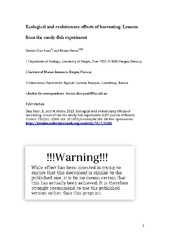Ecological and evolutionary effects of harvesting: lessons from the candy-fish experiment
Peer reviewed, Journal article
Accepted version

Åpne
Permanent lenke
https://hdl.handle.net/1956/16347Utgivelsesdato
2013-11Metadata
Vis full innførselSamlinger
Originalversjon
https://doi.org/10.1093/icesjms/fst160Sammendrag
Understanding the challenges of sustainable fisheries management is not easy for non-specialists, and even many specialists fail to appreciate the potential evolutionary consequences of harvest. We propose candy-fish experiments as a savoury approach to teaching and disseminating the key principles of applied ecology and evolution to students, practitioners and the general public. We performed a simple experiment where the resource was represented by fish-shaped candy of distinct colours and flavours (strawberry and liquorice). Typically, harvesting was neither ecologically sustainable (55% of the populations were extinct by the end of the experiment) nor evolutionarily sustainable (most surviving populations had liquorice fish only). This harvest-induced evolution went apparently unnoticed. Somewhat encouragingly, the harvest was most likely ecologically sustainable when a person spontaneously took the role of a stock manager.